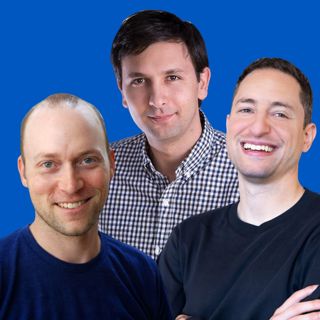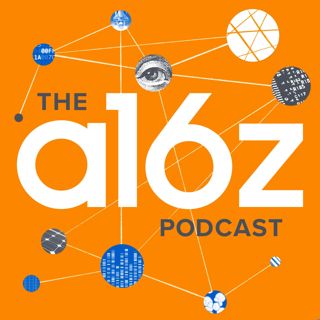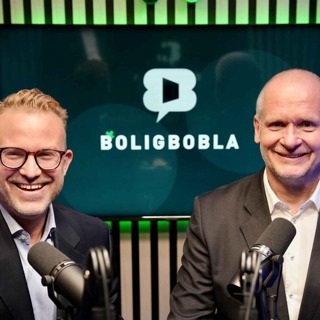
Ben Horowitz and Ali Ghodsi: How to Run a Billion-Dollar Business
Ben Horowitz founded Loudcloud in the middle of the dot-com bust and sold it for $1.6 billion, then led Andreessen Horowitz from its founding to $46 billion in committed capital. Ali Ghodsi co-founded Databricks, stepped in as CEO during a crisis, and led it to a valuation of over $100 billion.In this episode of “Boss Talk”, Ben and Ali join a16z General Partners Sarah Wang and Erik Torenberg to share founder war stories, how to hire and make deals, how to keep culture intense without burning employees out, and why founders should raise their ambitions even higher. ResourcesFollow Ali on X: https://x.com/alighodsiLearn more about Databricks: https://www.databricks.com/Follow Ben on X: https://x.com/bhorowitzFollow Sarah on X: https://x.com/sarahdingwangFollow Erik on X: https://x.com/eriktorenberg Stay Updated: If you enjoyed this episode, be sure to like, subscribe, and share with your friends!Resources:Find a16z on X: https://x.com/a16zSubscribe to a16z on Substack: https://a16z.substack.com/Find a16z on LinkedIn: https://www.linkedin.com/company/a16zListen to the a16z Podcast on Spotify: https://open.spotify.com/show/5bC65RDvs3oxnLyqqvkUYXListen to the a16z Podcast on Apple Podcasts: https://podcasts.apple.com/us/podcast/a16z-podcast/id842818711Follow our host: https://x.com/eriktorenberg Stay Updated:Find a16z on XFind a16z on LinkedInListen to the a16z Podcast on SpotifyListen to the a16z Podcast on Apple PodcastsFollow our host: https://twitter.com/eriktorenberg Please note that the content here is for informational purposes only; should NOT be taken as legal, business, tax, or investment advice or be used to evaluate any investment or security; and is not directed at any investors or potential investors in any a16z fund. a16z and its affiliates may maintain investments in the companies discussed. For more details please see a16z.com/disclosures. Hosted by Simplecast, an AdsWizz company. See pcm.adswizz.com for information about our collection and use of personal data for advertising.
10 Okt 1h 7min

Sam Altman on Sora, Energy, and Building an AI Empire
Sam Altman has led OpenAI from its founding as a research nonprofit in 2015 to becoming the most valuable startup in the world ten years later.In this episode, a16z Cofounder Ben Horowitz and General Partner Erik Torenberg sit down with Sam to discuss the core thesis behind OpenAI’s disparate bets, why they released Sora, how they use models internally, the best AI evals, and where we’re going from here. Resources:Follow Sam on X: https://x.com/samaFollow OpenAI on X: https://x.com/openaiLearn more about OpenAI: https://openai.com/Try Sora: https://sora.com/Follow Ben on X: https://x.com/bhorowitz Stay Updated: If you enjoyed this episode, be sure to like, subscribe, and share with your friends!Find a16z on X: https://x.com/a16zFind a16z on LinkedIn: https://www.linkedin.com/company/a16zListen to the a16z Podcast on Spotify: https://open.spotify.com/show/5bC65RDvs3oxnLyqqvkUYXListen to the a16z Podcast on Apple Podcasts: https://podcasts.apple.com/us/podcast/a16z-podcast/id842818711Follow our host: https://x.com/eriktorenbergPlease note that the content here is for informational purposes only; should NOT be taken as legal, business, tax, or investment advice or be used to evaluate any investment or security; and is not directed at any investors or potential investors in any a16z fund. a16z and its affiliates may maintain investments in the companies discussed. For more details please see a16z.com/disclosures. Stay Updated:Find a16z on XFind a16z on LinkedInListen to the a16z Podcast on SpotifyListen to the a16z Podcast on Apple PodcastsFollow our host: https://twitter.com/eriktorenberg Please note that the content here is for informational purposes only; should NOT be taken as legal, business, tax, or investment advice or be used to evaluate any investment or security; and is not directed at any investors or potential investors in any a16z fund. a16z and its affiliates may maintain investments in the companies discussed. For more details please see a16z.com/disclosures. Hosted by Simplecast, an AdsWizz company. See pcm.adswizz.com for information about our collection and use of personal data for advertising.
8 Okt 48min

How to Build a Real Estate Marketplace - Kaz Nejatian, Opendoor CEO
Opendoor is trying to make it easier to buy a home. Kaz Nejatian just joined as CEO to help them succeed.In this episode, a16z General Partners Alex Rampell and Erik Torenberg sit down with Kaz to cover all things real estate and marketplaces. They cover Kaz’s vision for Opendoor, the problem with copying the hedge fund model, how to build through economic downturns, and the importance of ambition and long-term thinking. Resources:Follow Kaz on X: https://x.com/CanadaKazFollow Alex on X: https://x.com/arampell Stay Updated: If you enjoyed this episode, be sure to like, subscribe, and share with your friends!Resources:Find a16z on X: https://x.com/a16zFind a16z on LinkedIn: https://www.linkedin.com/company/a16zListen to the a16z Podcast on Spotify: https://open.spotify.com/show/5bC65RDvs3oxnLyqqvkUYXListen to the a16z Podcast on Apple Podcasts: https://podcasts.apple.com/us/podcast/a16z-podcast/id842818711Follow our host: https://x.com/eriktorenbergPlease note that the content here is for informational purposes only; should NOT be taken as legal, business, tax, or investment advice or be used to evaluate any investment or security; and is not directed at any investors or potential investors in any a16z fund. a16z and its affiliates may maintain investments in the companies discussed. For more details please see a16z.com/disclosures. Stay Updated:Find a16z on XFind a16z on LinkedInListen to the a16z Podcast on SpotifyListen to the a16z Podcast on Apple PodcastsFollow our host: https://twitter.com/eriktorenberg Please note that the content here is for informational purposes only; should NOT be taken as legal, business, tax, or investment advice or be used to evaluate any investment or security; and is not directed at any investors or potential investors in any a16z fund. a16z and its affiliates may maintain investments in the companies discussed. For more details please see a16z.com/disclosures. Hosted by Simplecast, an AdsWizz company. See pcm.adswizz.com for information about our collection and use of personal data for advertising.
7 Okt 55min

Can the US Beat China’s Engineering State?
From high-speed rail to electric cars to batteries to AI, it’s clear that China can operate with incredible speed at massive scale. Can the US still compete?We sat down with Dan Wang, a Research Fellow at the Hoover Institution and the author of “Breakneck: China’s Quest to Engineer the Future” to discuss. Timecodes: 0:00 Introduction1:36 Lawyers vs. Engineers: Cultural and Economic Differences4:06 Urban and Rural Life: Comparing Infrastructure7:20 Barriers to Progress: Regulation and Governance11:00 Industrial Policy and Public-Private Partnerships14:20 The Double-Edged Sword of Legal and Engineering Mindsets16:50 Social Engineering and Policy in China23:00 Competition, Intellectual Property, and Business Culture27:10 Manufacturing, Scale, and Global Supply Chains36:00 Lessons from Japan and Korea41:30 Complacency, Quality, and the Future of Competition48:45 Strategic Resources and Industrial Policy54:00 Foreign Policy: Engineering Diplomacy vs. Alliances59:00 Taiwan, Demographics, and the Future of US-China Relations Resources:Follow Dan on X: https://x.com/danwwangRead Dan’s blog: https://danwang.co/Buy Breakneck on Amazon: https://www.amazon.com/dp/1324106034/Follow Steven on X: https://x.com/stevesi Stay Updated:Find a16z on XFind a16z on LinkedInListen to the a16z Podcast on SpotifyListen to the a16z Podcast on Apple PodcastsFollow our host: https://twitter.com/eriktorenberg Please note that the content here is for informational purposes only; should NOT be taken as legal, business, tax, or investment advice or be used to evaluate any investment or security; and is not directed at any investors or potential investors in any a16z fund. a16z and its affiliates may maintain investments in the companies discussed. For more details please see a16z.com/disclosures. Hosted by Simplecast, an AdsWizz company. See pcm.adswizz.com for information about our collection and use of personal data for advertising.
6 Okt 1h 3min

Monitoring the Situation #2: Alana Newhouse
Two trends in media have been abundantly clear since 2020: legacy media is dying, and independent media is rising.a16z General Partners Erik Torenberg and Katherine Boyle sit down with Tablet founder and editor-in-chief Alana Newhouse to discuss the great media realignment, why real institutions will outlast the new “internet pirates", Alana’s deeply personal case for gene editing, and how faith, science, and community can coexist without giving in to government referees. Resources:Read Tablet magazine: https://www.tabletmag.com/Follow Alana on X: https://x.com/alananewhouseFollow Tablet on X: https://x.com/tabletmagFollow Katherine on X: https://x.com/KTmBoyle Stay Updated: If you enjoyed this episode, be sure to like, subscribe, and share with your friends!Find a16z on X: https://x.com/a16zFind a16z on LinkedIn: https://www.linkedin.com/company/a16zListen to the a16z Podcast on Spotify: https://open.spotify.com/show/5bC65RDvs3oxnLyqqvkUYXListen to the a16z Podcast on Apple Podcasts: https://podcasts.apple.com/us/podcast/a16z-podcast/id842818711Follow our host: https://x.com/eriktorenbergPlease note that the content here is for informational purposes only; should NOT be taken as legal, business, tax, or investment advice or be used to evaluate any investment or security; and is not directed at any investors or potential investors in any a16z fund. a16z and its affiliates may maintain investments in the companies discussed. For more details please see a16z.com/disclosures. Stay Updated:Find a16z on XFind a16z on LinkedInListen to the a16z Podcast on SpotifyListen to the a16z Podcast on Apple PodcastsFollow our host: https://twitter.com/eriktorenberg Please note that the content here is for informational purposes only; should NOT be taken as legal, business, tax, or investment advice or be used to evaluate any investment or security; and is not directed at any investors or potential investors in any a16z fund. a16z and its affiliates may maintain investments in the companies discussed. For more details please see a16z.com/disclosures. Hosted by Simplecast, an AdsWizz company. See pcm.adswizz.com for information about our collection and use of personal data for advertising.
5 Okt 58min

Software is Eating Labor
Software has fundamentally changed the way we record, store, and share information. Its next act is to fundamentally change the nature of our economy, capturing trillions of dollars of value in the process.In this talk from the 2025 a16z LP Summit, a16z General Partner Alex Rampell discusses the history of filing cabinets and databases, how SaaS pricing moved from seats to outcomes, and how AI agents will accelerate the trend of the last 70 years of software progress. Timecodes: 0:00 Introduction0:58 The Scale of the Labor Market vs. SaaS 1:41 Capital, Labor, and Automation: A Historical Perspective 3:32 The Filing Cabinet Metaphor: Digitizing Work 3:50 Case Studies: From Airlines to Accounting 8:42 The Limits of Efficiency: Humans Still in the Loop 9:02 Rethinking SaaS Pricing Models 10:21 The Impact of AI on Labor and Software 11:41 Outcome-Based Software: Moving Beyond the Filing Cabinet 17:41 Real-World Examples: AI in Action 22:05 The Expanding Market: New Opportunities with AI 25:44 Conclusion and Takeaways 25:48 Podcast Outro and Disclaimers Resources: Follow Alex on X: https://x.com/arampell Stay Updated: If you enjoyed this episode, be sure to like, subscribe, and share with your friends!Find a16z on X: https://x.com/a16zFind a16z on LinkedIn: https://www.linkedin.com/company/a16zListen to the a16z Podcast on Spotify: https://open.spotify.com/show/5bC65RDvs3oxnLyqqvkUYXListen to the a16z Podcast on Apple Podcasts: https://podcasts.apple.com/us/podcast/a16z-podcast/id842818711Follow our host: https://x.com/eriktorenbergPlease note that the content here is for informational purposes only; should NOT be taken as legal, business, tax, or investment advice or be used to evaluate any investment or security; and is not directed at any investors or potential investors in any a16z fund. a16z and its affiliates may maintain investments in the companies discussed. For more details please see a16z.com/disclosures. Stay Updated:Find a16z on XFind a16z on LinkedInListen to the a16z Podcast on SpotifyListen to the a16z Podcast on Apple PodcastsFollow our host: https://twitter.com/eriktorenberg Please note that the content here is for informational purposes only; should NOT be taken as legal, business, tax, or investment advice or be used to evaluate any investment or security; and is not directed at any investors or potential investors in any a16z fund. a16z and its affiliates may maintain investments in the companies discussed. For more details please see a16z.com/disclosures. Hosted by Simplecast, an AdsWizz company. See pcm.adswizz.com for information about our collection and use of personal data for advertising.
3 Okt 26min

The Ben & Marc Show: China Has Scale. Can America Catch Up?
Ben, Marc, and Erik Torenberg are joined by Brian Schimpf, Co-Founder & CEO of Anduril, and Chris Power, Founder & CEO of Hadrian. Together, they dig into America’s defense production gap: why the U.S. can out-innovate but not out-produce—and what it will take to turn that around.They discuss why U.S. war games show we run out of munitions in a week, the myth of “exquisite-only” systems, how to rebuild industrial capacity with software-led automation, financing factories like data centers, and what it takes to create real deterrence in a Taiwan scenario. Timecodes: 0:00 Introduction0:27 Technical Superiority vs. Industrial Scale 3:59 The Decline of US Manufacturing 7:23 Challenges in Onshoring & Skilled Labor 13:27 Supply Chains & Rare Earths 15:34 Automation, Software, and Catching Up 17:15 Complexity of Modern Production 23:34 Strategic Policy & Industrial Planning 26:37 Regulatory Barriers & State vs. Federal Roles 35:27 Talent, Data Centers, and Financial Engineering 38:33 China’s Industrial Policy & US Response 46:07 US Manufacturing, National Security, and the China Challenge 52:00 Demographics, Long-Term Outlook, and Closing Thoughts Resources: Find Chris on X: https://x.com/chris_powerFind Brian on LinkedIn: https://www.linkedin.com/in/bschimpf/Marc on X: https://x.com/pmarcaMarc’s Substack: https://pmarca.substack.com/Ben on X: https://x.com/bhorowitz Stay Updated: Find us on X:https://x.com/a16zFind us on LinkedIn: https://www.linkedin.com/company/a16zThe views expressed here are those of the individual personnel quoted and are not the views of a16z or its affiliates. This content is provided for informational purposes only, and should not be relied upon as legal, business, investment, or tax advice. Furthermore, this content is not directed at nor intended for use by any investors or prospective investors and may not under any circumstances be relied upon when making a decision to invest in any a16z funds. PLEASE SEE MORE HERE: https://a16z.com/disclosures/ Stay Updated:Find a16z on XFind a16z on LinkedInListen to the a16z Podcast on SpotifyListen to the a16z Podcast on Apple PodcastsFollow our host: https://twitter.com/eriktorenberg Please note that the content here is for informational purposes only; should NOT be taken as legal, business, tax, or investment advice or be used to evaluate any investment or security; and is not directed at any investors or potential investors in any a16z fund. a16z and its affiliates may maintain investments in the companies discussed. For more details please see a16z.com/disclosures. Hosted by Simplecast, an AdsWizz company. See pcm.adswizz.com for information about our collection and use of personal data for advertising.
2 Okt 57min

Cheeky Pint: Marc Andreessen, John Collison & Charlie Songhurst on Tech’s Big Questions
Today we’re sharing a feed drop from Cheeky Pint, where Stripe cofounder and president John Collison chats with legends in technology over a pint of Guinness.In this episode, John is joined by a16z cofounder Marc Andreessen and tech investor Charlie Songhurst for a candid conversation about bubbles, downturns, and the psychology of markets. They discuss what makes Silicon Valley so hard to replace, the deep history of the Valley’s ecosystem, and the future of media. From the lessons of the dot-com crash to the future of venture capital and startups, this is an inside look at how big cycles shape innovation and what it takes to build on the frontier. Timecodes: 0:00 Introduction 1:56 Marc Andreessen’s early internet stories3:10 Silicon Valley, risk, and downturns8:30 Marc Andreessen’s early internet days11:52 Investing across cycles16:30 Can you tell when you’re in a bubble?19:10 Trust, high-status VCs & preferential attachment27:00 Venture capital, startups, and investment cycles33:34 East Coast vs. West Coast: risk and culture44:00 High trust culture in Silicon Valley50:00 Why Silicon Valley, not Boston or Europe?55:00 Company tragedies and missed opportunities1:00:00 The internet boom, bubbles, and AI parallels1:15:00 AI’s impact: productivity, jobs, and society1:35:00 Crypto, stablecoins, and fintech1:50:00 Public vs. private markets & venture strategy2:00:00 Big companies, competition, and bureaucracy2:05:00 Boards, governance, and the Elon Musk method Resources: Watch more episodes from Cheeky Pint: https://www.youtube.com/@stripeListen to Cheeky Pint on Apple Podcasts: https://podcasts.apple.com/us/podcast/cheeky-pint/id1821055332Find John on X: https://x.com/collisionFind Charlie on LinkedIn: https://www.linkedin.com/in/charlessonghurst/Follow Marc on X: https://x.com/pmarcaMarc’s Substack: https://pmarca.substack.com/ Stay Updated: Find us on X: https://x.com/a16zFind us on LinkedIn: https://www.linkedin.com/company/a16zThis information is for general educational purposes only and is not a recommendation to buy, hold, or sell any investment or financial product. Any investments or portfolio companies mentioned, referred to, or described in this podcast are not representative of all a16z investments and there can be no assurance that the investments will be profitable or that other investments made in the future will have similar characteristics or results. A list of investments made by a16z is available at https://a16z.com/investment-list/. All investments involve risk, including the possible loss of capital. Past performance is no guarantee of future results and the opinions presented cannot be viewed as an indicator of future performance. Before making decisions with legal, tax, or accounting effects, you should consult appropriate professionals. Information is from sources deemed reliable on the date of publication, but a16z does not guarantee its accuracy. Stay Updated:Find a16z on XFind a16z on LinkedInListen to the a16z Podcast on SpotifyListen to the a16z Podcast on Apple PodcastsFollow our host: https://twitter.com/eriktorenberg Please note that the content here is for informational purposes only; should NOT be taken as legal, business, tax, or investment advice or be used to evaluate any investment or security; and is not directed at any investors or potential investors in any a16z fund. a16z and its affiliates may maintain investments in the companies discussed. For more details please see a16z.com/disclosures. Hosted by Simplecast, an AdsWizz company. See pcm.adswizz.com for information about our collection and use of personal data for advertising.
1 Okt 2h 9min






















